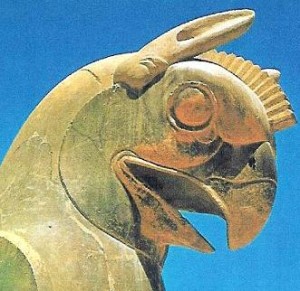Encylopedia Britannica and Nizami Ganjavi

Dear Distinguished Members of the Encyclopedia Britannica,
It has come to my humble attention on this day, November 13, 2008 that you have changed your citation of Nizami Ganjavi from that of a Persian Poet to Persian “language” poet. This very designation (Persian “language” poet) is a term that has origins by the propagandists of of the former Soviet Union, and especially Joseph Stalin. It was Soviet dictator Joseph Stalin who stated that Nizami Ganjavi “…must not be surrendered to Iranian literature, despite having written most of his poems in Persian.” (Kolarz, 1952). The statement was meant to distort that fact Nizami was Iranian in origin and that he wrote ALL of his works Persian. Post-Soviet Russian historians do acknowledge that Nizami was “one of the famous Persian poets…” and “…wrote exclusively in Persian” (From the Brockhaus and Efrona Encyclopedia (as cited by HOEB article of Moscow, Russia). Historical documents pertaining to Persian historical figures in the Caucasus were deliberately falsified by the Soviets (see Tiwali, 1984): one of their revisions entailed the portrayal of Nizami as being of “Caucasian nationality”. Other distortions involved the narrative that Nizami’s original poetry was composed in Turkic languages which was only later followed by “Farsi [Persian] translation”. None of these statements have any any basis in historical facts. Long before Soviet Russia, Czarist Russia had been working vigorously to promote pan-Turkism in the region to eliminate the Persian literary, cultural and historical legacy in the Caucasus. As you may know, Iran was forced to cede her possessions in the Caucasus (everything above the Araxes River just above Azarbaijan) to Russia. Hostler has noted that Czarist Russian, despite herr victory in the Caucasus, was very worried of the power of the Persian culture and language Iran over Arran (renamed Republic of Azarbaijan in 1918 - this is historically distinct from Azarbaijan in Iran): Hostler has noted that: - This cultural link between the newly conquered country [modern-day Republic of Azerbaijan, historically known as Arran until May 1918] and its still strong Persian neighbor annoyed Russia who tried to destroy it by supporting local Turkish cultural developments”(Hostler, 1957, p.22). Indeed, the local authorities in the khanates were either Persian-speaking or of aristocracies who spoke Persian. The Shiite clergy who held considerable influence over the local courts and schools, helped maintain the influence of Iranian culture in the Caucasus. Professor Swietochowski notes that The hold of Persian as the chief literary language in [the current Republic of ] Azerbaijan was broken, followed by the rejection of classical Azerbaijani, an artificial, heavily Iranized idiom that had long been in use along with Persian, though in a secondary position. This process of cultural change was initially supported by the Tsarist authorities, who were anxious to neutralize the still-widespread Azerbaijani identification with Persia.” (Swietochowski, 1995, p.29). This policy was consistent with Czarist policies with respect to other recently conquered non-Russian nationalities of the empire (1995, p.29). These policies were continued by the succeeding Soivet Empire, especially in the Caucasus. Professor Nazrin Mehdiyova, herself a historian from the modern Republic of Azerbaijan has astutely reported that:
“…the Soviet authorities falsified documents and re-wrote history books.” (Mehdiyova, 2003, p.280).
While a plethora of other references may be cited for you, the above citaitons serve to illustrate the misconcenption of the term “Persian language Poet”. Please feel free to correspond with me anytime at your convenience. Your attention to this matter is greatly appreciated indeed.
My Best Regards - Dr. Kaveh Farrokh
Historian – University of British Columbia Continuing Studies Division
Winner of WAALM’s Best History Book Award of 2008
Nominated for Top Three History Books of IBPA’s Benjamin Franklin Award
Member of Stanford University’s WAIS (World Association of International Studies)
Advisor of Iranian Studies for The Society for Hellenic-Iranian Studies
Historical Advisor for the History Channel
Academic Advisor of the Persian American Society
Director of the Archaeological Department of the Pasargard Heritage Foundation
Advisory Committee Member of the Dabiri Foundation
Member of the Iranian-Canadian Congress
Member of Iran Linguistics Society
Member of Persian Gulf Preservation Society
Thsi is how typical press in the Republic of Azerbaijan
poetrays Iranians and Iran:
http://www.today.az/news/politics/48929.html
Use of flase statistics and disinformation. They are using IRI’s
international isolation for por-rooi and it is the same with the UAE, As
Dr. T. said, we do not have a government to protect the interest

























 اخبار مربوط به زندانیان سیاسی و نقض حقوق بشر
اخبار مربوط به زندانیان سیاسی و نقض حقوق بشر

















 Tulips in Holland
Tulips in Holland












No comments:
Post a Comment